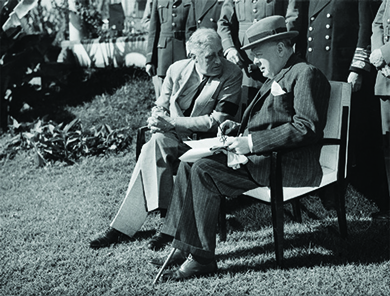| << Chapter < Page | Chapter >> Page > |

Preparing to engage the Nazis in Europe, the United States landed in North Africa in 1942. The Axis campaigns in North Africa had begun when Italy declared war on England in June 1940, and British forces had invaded the Italian colony of Libya. The Italians had responded with a counteroffensive that penetrated into Egypt, only to be defeated by the British again. In response, Hitler dispatched the Afrika Korps under General Erwin Rommel, and the outcome of the situation was in doubt until shortly before American forces joined the British.
Although the Allied campaign secured control of the southern Mediterranean and preserved Egypt and the Suez Canal for the British, Stalin and the Soviets were still engaging hundreds of German divisions in bitter struggles at Stalingrad and Leningrad. The invasion of North Africa did nothing to draw German troops away from the Soviet Union. An invasion of Europe by way of Italy, which is what the British and American campaign in North Africa laid the ground for, pulled a few German divisions away from their Russian targets. But while Stalin urged his allies to invade France, British and American troops pursued the defeat of Mussolini’s Italy. This choice greatly frustrated Stalin, who felt that British interests were taking precedence over the agony that the Soviet Union was enduring at the hands of the invading German army. However, Churchill saw Italy as the vulnerable underbelly of Europe and believed that Italian support for Mussolini was waning, suggesting that victory there might be relatively easy. Moreover, Churchill pointed out that if Italy were taken out of the war, then the Allies would control the Mediterranean, offering the Allies easier shipping access to both the Soviet Union and the British Far Eastern colonies.
A direct assault on Nazi Germany’s “Fortress Europe” was still necessary for final victory. On June 6, 1944, the second front became a reality when Allied forces stormed the beaches of northern France on D-day . Beginning at 6:30 a.m., some twenty-four thousand British, Canadian, and American troops waded ashore along a fifty-mile piece of the Normandy coast ( [link] ). Well over a million troops would follow their lead. German forces on the hills and cliffs above shot at them, and once they reached the beach, they encountered barbed wire and land mines. More than ten thousand Allied soldiers were wounded or killed during the assault. Following the establishment of beachheads at Normandy, it took months of difficult fighting before Paris was liberated on August 20, 1944. The invasion did succeed in diverting German forces from the eastern front to the western front, relieving some of the pressure on Stalin’s troops. By that time, however, Russian forces had already defeated the German army at Stalingrad, an event that many consider the turning point of the war in Europe, and begun to push the Germans out of the Soviet Union.

Notification Switch
Would you like to follow the 'U.s. history' conversation and receive update notifications?